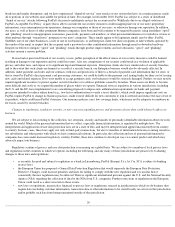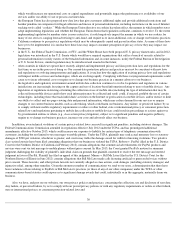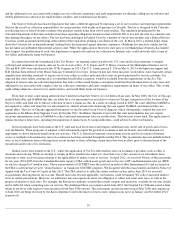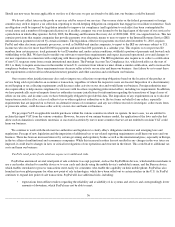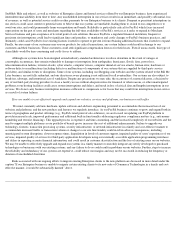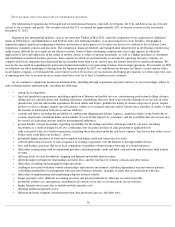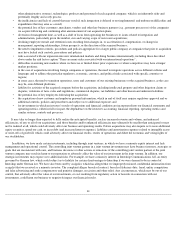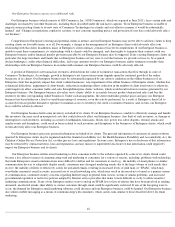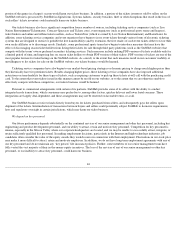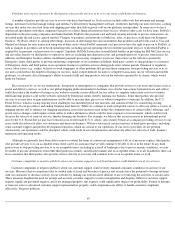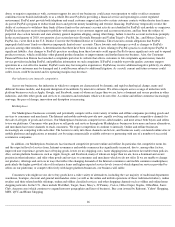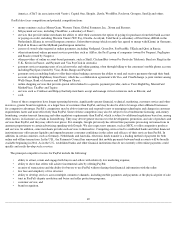eBay 2013 Annual Report Download - page 41
Download and view the complete annual report
Please find page 41 of the 2013 eBay annual report below. You can navigate through the pages in the report by either clicking on the pages listed below, or by using the keyword search tool below to find specific information within the annual report.
There are many risks associated with our international operations.
Our international expansion has been rapid and our international business, especially in Germany, the U.K. and Korea, has also become
critical to our revenues and profits. Net revenues outside the U.S. accounted for approximately 52%, of our net revenues in the year ended
December 31, 2013.
Expansion into international markets, such as our entry into Turkey in May 2011, upon the completion of our acquisition of additional
shares in GittiGidiyor, and Marketplaces' and PayPal's entry into emerging markets, is an increasing focus of our business. Geographical
expansion requires significant management attention and resources and requires us to localize our services to conform to local cultures, laws,
regulations, standards, policies and practices. The commercial, financial, Internet, and transportation infrastructure in developing countries may
make it more difficult for us to replicate our business models. Some of these developing countries may have legal regimes in which the
application of laws and regulations in the online or mobile context is subject to greater uncertainty, as well as a higher incidence of corruption
and fraudulent or unethical business practices, than countries in which we are historically accustomed to operating. In many countries, we
compete with local companies that understand the local market better than we do, and we may not benefit from first-to-market advantages. We
may not be successful in expanding into particular international markets or in generating revenues from foreign operations. For example, in 2002
we withdrew our eBay marketplace offering from the Japanese market. In 2007, we contributed our business in China to a joint venture with a
local Chinese company; we terminated this joint venture in 2012. Even if we are successful in developing new markets, we often expect the costs
of operating new sites to exceed our net revenues from those sites for at least 12 months in most countries.
As we continue to expand our businesses internationally, including through acquisitions and joint ventures, we are increasingly subject to
risks of doing business internationally, including the following:
39
•
strong local competitors;
• legal and regulatory requirements, including regulation of Internet and mobile services, auctioneering, professional selling, distance
selling, privacy and data protection, banking and money transmitting, that may limit or prevent the offering of our services in some
jurisdictions, prevent enforceable agreements between sellers and buyers, prohibit the listing of certain categories of goods, require
product or service changes, require special licensure, subject us to criminal sanctions and/or various taxes, penalties or audits, or limit
the transfer of information between us and our affiliates;
• customs and duties, including the possibility of cumbersome shipping and delivery logistics, significant delays at the border due to
customs inspections, maximum limits on the number of cross-border imports by consumers, and the possibility that our services may
be viewed as facilitating customs fraud by governmental authorities;
• greater liability or legal uncertainty regarding our liability for the listings and other content provided by our users, including
uncertainty as a result of unique local laws, conflicting court decisions and lack of clear precedent or applicable law;
• risks associated with cross-border transactions, including those described under the risk factor caption “Any factors that reduce cross-
border trade could harm our business,” above;
•
potentially higher incidence of fraud and corruption and higher credit and transaction loss risks;
• cultural ambivalence towards, or non-
acceptance of, trading or payments over the Internet or through mobile devices;
•
laws and business practices that favor local competitors or prohibit or limit foreign ownership of certain businesses;
• difficulties in integrating with local payment providers, including banks, credit and debit card networks and electronic fund transfer
systems;
•
differing levels of retail distribution, shipping and Internet and mobile infrastructures;
•
different employee/employer relationships and labor laws, and the existence of workers' councils and labor unions;
•
difficulties in staffing and managing foreign operations;
• challenges associated with joint venture relationships and minority investments, including dependence on joint venture partners,
controlling shareholders or management who may have business interests, strategies or goals that are inconsistent with ours;
•
difficulties in implementing and maintaining adequate internal controls;
•
longer payment cycles, different accounting practices and greater problems in collecting accounts receivable;
•
potentially adverse tax consequences, including local taxation of our fees or of transactions on our websites;
•
higher Internet service provider or mobile network operator costs;
•
differing intellectual property laws;
•
different and more stringent consumer protection, data protection, privacy and other laws;


